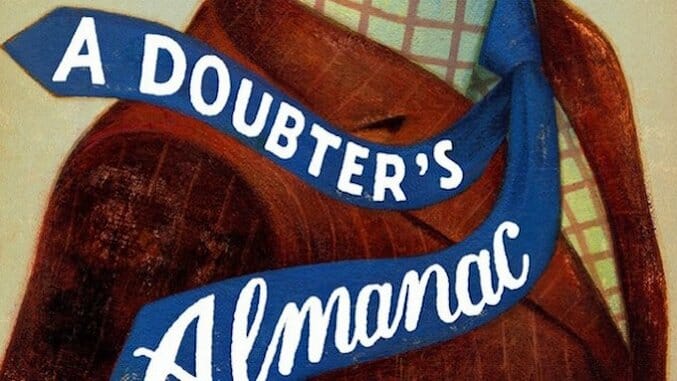A Doubter’s Almanac by Ethan Canin

In Ethan Canin’s 1994 short story “Batorsag and Szerelem,” the younger brother of a mathematics prodigy watches his family unravel after his brother retreats into his own world. Although both parents delight in their son’s emerging genius, each family member privately suspects it’s the cause of his emotional distance, increasingly strange behavior and incipient undoing. Observing his mother’s desperate fascination with his older brother’s genius, the narrator reflects, “She liked to call him ‘cerebral’ instead of ‘smart,’ which to me made his intelligence sound like an overgrowth, like a vine that would one day pull down a tree.”
In one sense, Canin’s staggeringly ambitious and remarkably realized new novel, A Doubter’s Almanac, expands on the theme of genius as a debilitating condition. In chronicling the cradle-to-grave misadventures of Fields Medal mathematician Milo Andret—first in a closely observed third-person narrative, then from the alternately jaundiced and forgiving perspective of Milo’s similarly gifted son—Canin portrays Milo’s genius as a sort of congenital wrecking ball, its force calculated to destroy its owner and everyone else in its path.
 “Batorsag and Szerelem” and “The Year of Getting to Know Us,” another early Canin story that measures father-son distance, both feel heavy at times and somewhat familiar in the crowded canon of family-centric short fiction. A Doubter’s Almanac, by contrast, maintains a refreshing buoyancy even at its saddest moments. Canin’s writing boasts a playful energy that delights even as it digs deeper into mathematics and topology.
“Batorsag and Szerelem” and “The Year of Getting to Know Us,” another early Canin story that measures father-son distance, both feel heavy at times and somewhat familiar in the crowded canon of family-centric short fiction. A Doubter’s Almanac, by contrast, maintains a refreshing buoyancy even at its saddest moments. Canin’s writing boasts a playful energy that delights even as it digs deeper into mathematics and topology.
Our first two significant glimpses into Milo’s genius are utterly fascinating. Growing up in Cheboygan, Michigan in the 1950s and ’60s with no friends, Milo spends most of his time alone in the woods behind his family’s house. At 13, after a violent windstorm, Milo discovers a massive tree stump and decides to carve it into a 25-foot wooden chain of Mobius strip-like perfection. Later, Milo gains admission to the PhD program in mathematics at UC Berkeley by detailing how he guided his family home—without any landmarks or visual aids—from a boating excursion gone awry. “He’d long been able to picture the world, all of its six directions, his exact place in a three-dimensional topography,” Canin explains. “For as long as he could remember, his surroundings had been forming themselves into an inverted, low-sloping bowl, a hemisphere of smoothly shifting coordinates in which his center was continually being recalibrated.”
From the outset, Canin also candidly details the sociopathic tendencies and inability to connect with other humans that make Milo an eternal misfit. He’s recognized immediately for operating on a higher plane than his colleagues at Berkeley, yet he attempts to form relationships (but mostly discovers sex and bourbon). He also resolves a historically complex theorem that brings him worldwide recognition and lands him a job on the mathematics faculty at Princeton. When Milo leaves for Princeton, his Berkeley mentor warns him that he probably has about five years left before his genius will begin to unravel—an undoing that takes center stage in the rest of the novel.
-

-

-

-

-

-

-

-

-

-

-

-

-

-

-

-

-

-

-

-

-

-

-

-

-

-

-

-

-

-

-

-

-

-

-

-

-

-

-

-








































